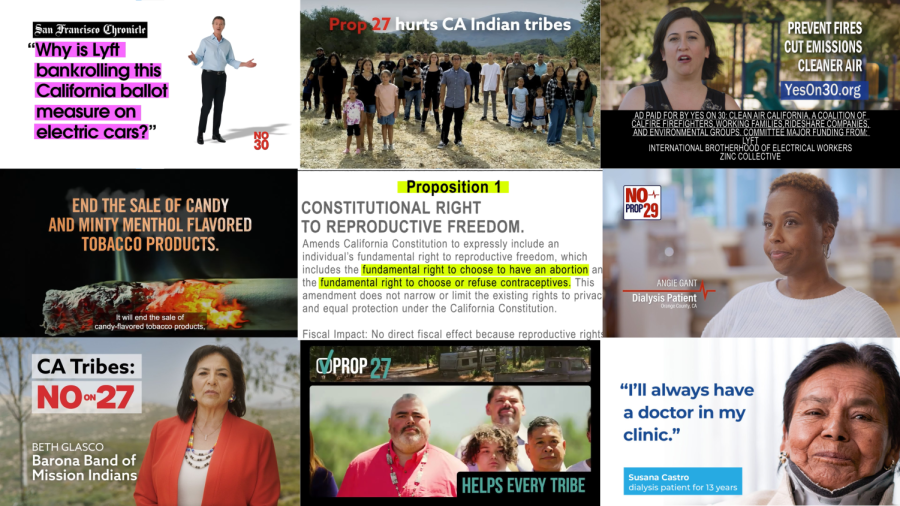A guide to propositions in the California 2022 Election
A collage of advertisements for this year’s statewide proposition elections. Next month, Californians will vote on seven important ballot measures that will affect the state in issues ranging from abortion to art funding.
California’s General Election on November 8, 2022 will allow voters to weigh in on seven contentious statewide ballot measures. Here is a guide to each measure, what they mean and how they might affect our state.
- Proposition 1, the Constitutional Right to Reproductive Freedom, was passed in the California Senate on Monday, June 27, following the overturning of Roe v. Wade. Proposition 1 adds provisions regarding abortion and contraceptive rights to California’s constitution; since these rights are already protected in California, there would not be a direct fiscal impact to the state, but the Proposition would codify the rights in the Constitution. The amendment is expected to pass by a wide margin.
- Proposition 26, the Legalize Sports Betting on American Indian Lands Initiative, is a California constitutional and statute amendment, meaning a new law would be implemented if the proposition is passed. If approved, the initiative would legalize all sports wagering in Native American casinos, but participating racetracks and casinos on Indigenous land would have to pay taxes to the state, and such gambling would be regulated.
- Proposition 27, the Legalize Sports Betting and Revenue for Homelessness Prevention Fund Initiative, also tackles gambling laws for Native American territories. If passed, it would allow Native American tribes and affiliated businesses to conduct virtual sports wagering outside tribal boundaries, effectively legalizing online sports gambling across the state. Companies offering online sports betting would have to pay taxes to the state and would face regulation. If the proposition is rejected, no changes will be made to state gambling laws and virtual sports gambling will remain illegal.
- Proposition 28, the Art and Music K-12 Education Funding Initiative, would provide additional state funding for art and music education in all K–12 public and charter schools. It guarantees additional funding to all public schools without a tax increase, increasing state costs by around $1 billion annually. A rejection of Proposition 28 would mean that arts education funding in California public schools would remain up to state and local budgetary decisions.
- Proposition 29, the Dialysis Clinic Requirements Initiative, would require a licensed doctor, nurse practitioner or physician assistant to be present during treatment at outpatient kidney dialysis clinics. Clinics are required to report infection data to the state, and clinic ownership information has to be posted publicly. It would increase costs for dialysis clinics statewide.
- Proposition 30, the Tax on Income Above $2 Million for Zero-Emissions Vehicles and Wildfire Prevention Initiative, would raise taxes on those with an annual income of over $2 million by 1.75 percent; these taxes will fund wildfire management and electric vehicle infrastructure, including subsidies and more. Lyft has contributed $15 million into the proposition, and is the Proposition’s biggest contributor by far.
- Proposition 31, the Flavored Tobacco Products Ban Referendum, is a veto referendum. In other words, the proposition decides whether or not to uphold Senate Bill 793, which bans the sale of flavored tobacco products, bar hookah tobacco, loose leaf tobacco and premium cigars. Tobacco retailers will be fined $250 per violation sale if passed. If the proposition doesn’t pass, the bill will be overturned, but if it passes, the law will remain.





